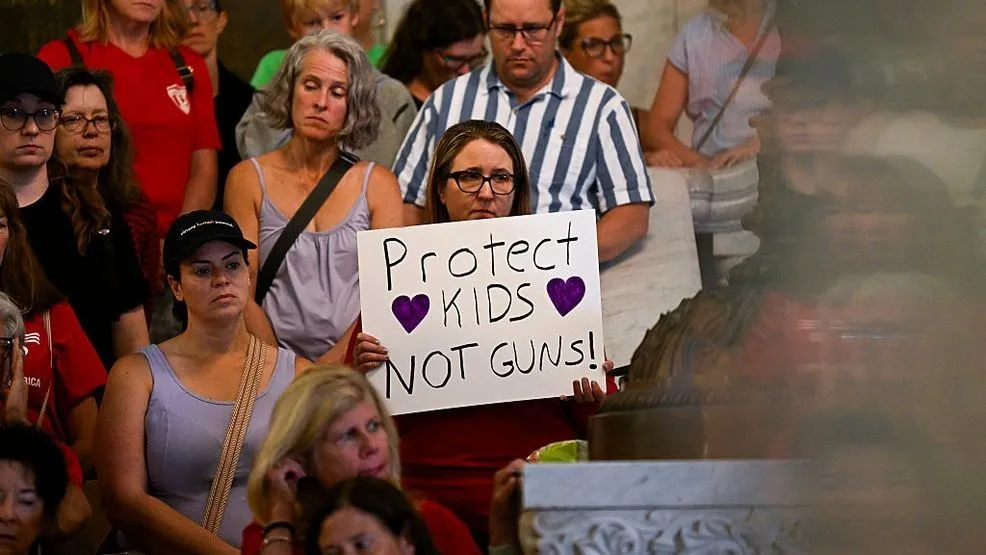WASHINGTON (TNND) -- The Trump administration cut funding that would have been used for efforts to identify potential mass shooters from Minnesota a month before a shooter opened fire at a church on Wednesday.
Wednesday's shooting was one of three that took place within two days in Minnesota.
The grants were a part of $18.5 million in cuts to a program from the Department of Homeland Security that the administration claimed were partisan and unsuccessful.
Some experts and lawmakers say the program was crucial in spotting early warning signs of mass shooters like Robin Westman.
"The capacity to combat domestic terrorism is eroding," Jacob Ware, a research fellow at the Council on Foreign Relations, told CNN. "It seems like the eye has been taken off the ball in terms of domestic terrorism prevention in this country - that terrorism is not that major a concern."
Westman also questioned not being identified as a potential threat by authorities in journal writings.
"Should be harder for people like me to carry out these attacks," Westman wrote in one entry.
In another journal entry, Westman thought purchases made would draw suspicion, writing, "I have been showing signs for a while, I need to be stopped! I don't want to abandon my plan, but I really want to be stopped for the sake of my family."
The grants were run by the Center for Prevention Programs and Partnerships (CP3), a program run by DHS, which funded local programs to oversee mass violence threats at the Minnesota Department of Public Safety and Hennepin County Sheriff's Office.
In July, the DHS pulled funds from the two local agencies, totaling about $800,000. A letter from DHS reported by CNN accused the money of going to "openly partisan and political organizations."
On Friday, a DHS spokesperson released a statement defending the decision to pull those funding, saying "the grant program previously administered by CP3 was nothing more than a slush fund for left-wing ideologies, and did next to nothing to combat actual threats in our communities."
Though some lawmakers say the spokesperson's arguments are baseless and removing the grants left Minnesota less equipped to prevent tragedies like Wednesday's attack at Annunciation Catholic School.
Democratic Rep. Betty McCollum was one of six Democratic lawmakers who sent a letter to the DHS earlier in August asking to reinstate the DHS' grant to the Minnesota Department of Public Safety.
She wrote that the grant, "limits our state law enforcement from access to vital federal counterterrorism partners and resources and leaves Minnesota communities more vulnerable to violent attacks."
That letter was sent after the shooting of state lawmakers in June, leading to the death of former Minnesota House Speaker Melissa Hortman and her husband Mark Hortman.
"Never in our worst nightmares could we have imagined another tragedy occurring so soon," McCollum said on Friday.
Westman wrote in journal entries, "I have dropped a few warning signs to a few people. Nothing crazy, but if I did something, they would say it was obvious in hindsight."
Westland had recently broken up with a long-term partner, according to journal entries, purchased three firearms within a month while frequenting gun ranges and quit a job at the local marijuana dispensary.
The programs administered by the CP3 aimed to assist local communities in recognizing similar signs. Though when the Biden administration announced the start of the initiative in 2021, an attorney with the American Civil Liberties Union criticized the program as "ineffective, discriminatory and harmful to Muslims and communities of color."
The grant specifically for Minnesota's Department of Public Safety was targeted for assessing school shooters. The funds would have been used to help create a statewide threat assessment and management team focused on "persons of concern, potential active shooters, school shootings/threats, stalking, and workplace violence."
For the Hennepin County Sheriff's Office, the grant was going towards establishing "a multidisciplinary team" whose goal was to "engage more actively with mental health professionals, school officials, social workers, and probation officers."
Those programs could have potentially had an impact on identifying Westman before Wednesday's attack, according to some experts and officials.
When cuts to the CP3 program were announced in July, the DHS called the grants "wasteful" and were intended "to push woke, partisan agendas and silencing dissent."
After the shooting in Minnesota, First Lady Melania Trump called for more preemptive interventions to stop and identify potential shooters before tragedy strikes.
"To prevent future tragedies, it is crucial we look into behavioral threat assessments across all levels of society -- beginning in our homes, extending through school districts and of course, social media platforms," she posted on X. "Being aware of these warning signs and acting quickly can save lives and make American communities safer."
